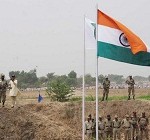The border between India and Pakistan in Jammu and Kashmir has witnessed an escalation of violence due to ceasefire violations that have resulted in the death of civilians. The deteriorating situation along the border is increasing tensions between India and Pakistan. Sameer Patil, associate national security fellow at Gateway House, comments on the situation.
Statement:
“The recent spate of violence along the India-Pakistan border in Jammu has been the worst military escalation that the region has seen since the ceasefire was declared in 2003. Pakistan’s civilian government was weakened by the anti-government protests led by Imran Khan and Tahir ul Qadri, during which period the Pakistani Army strengthened its domestic foothold. Although it is Pakistani Rangers that are targeting Indian border posts and villages, the attacks are actually controlled by the Pakistan Army, which is bolstered by the success of its North Waziristan offensive against the Pakistani Taliban, evident from the militant casualties and the inability of the TTP to strike back.
The likely intent behind these cross-border firings from the Pakistani side is to keep the Kashmir issue alive internationally, which Pakistan has attempted in the past as well. However, the Pakistani Army did not expect a robust Indian response to the firing, which has resulted in significant damages and casualties on the Pakistani side. The Pakistani Army in turn increased the ammunition used and number of targeted posts. This exchange of fire between the two countries is primarily responsible for the current escalation of violence on the border.
India has maintained that it will not hold a flag meeting with Pakistan till the cross-border firing ends. The Indian leadership has conveyed to the Army and the Border Security Force that they must be prepared for the long haul. As winter approaches, cross-border militant infiltration in north Kashmir is also likely to increase from the Pakistani side. India has increased its vigil on the Line of Control (LoC) and hence, more infiltration-related skirmishes are expected in North Kashmir. This is likely to make the situation along the LoC also tense. Furthermore, external or third party mediation is unlikely because the escalation in cross-border firing has taken place along the international border and not along the LoC. This denies Pakistan and other outside powers the opportunity to put pressure on India to de-escalate.
India was already limiting its engagements with Pakistan due to the political crisis in the country surrounding Nawaz Sharif’s government. Now with the addition of the current crisis along the international border, the possibility of a positive partnership between India and Pakistan looks bleak.”
For more information or interview requests, please contact Reetika Joshi at joshi.reetika@gatewayhouse.in.


